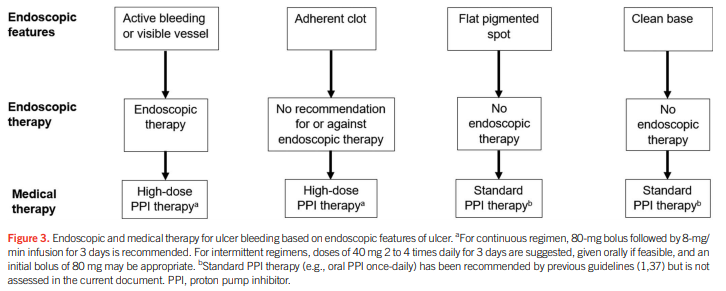Key Points
Guidelines recommend high-dose PPI treatment (i.e., pantoprazole (Protonix) 80 mg per day) for the first 72 hours post-endoscopy because this is when rebleeding risk is highest.
If interventions are done during endoscopy when there is an active bleed or exposed blood vessel, it is recommended that the patient remain on IV PPI BID for the 72 hours post-endoscopy. If a patient has a clean-based ulcer, PPI can be switched from IV to oral.
After 72 hours of high-dose therapy, patients with high-risk endoscopic lesions should receive PPI BID for 14 days (if low risk ppi daily) then if there was a peptic ulcer bleed continue daily PPI for 4-8 wks.
Podcasts
#355 GI Bleed with Dr. Tanvi Dhere - The Curbsiders
AJG Author Podcasts - American College of Gastroenterology (gi.org)
Articles
Diagnosis of Gastrointestinal Bleeding in Adults | AAFP
Acute Lower Gastrointestinal Bleeding: Evaluation and Management | AAFP
A 2017 meta-analysis of nine RCTs showed no difference between oral & IV PPIs in recurrent bleeding, surgery, or mortality when initiated prior to endoscopic diagnosis in upper GI bleeding. In practice we do typically start with IV though.
Guidelines
ACG Clinical Guideline: Upper Gastrointestinal and Ulcer Bleeding - PubMed (nih.gov)

